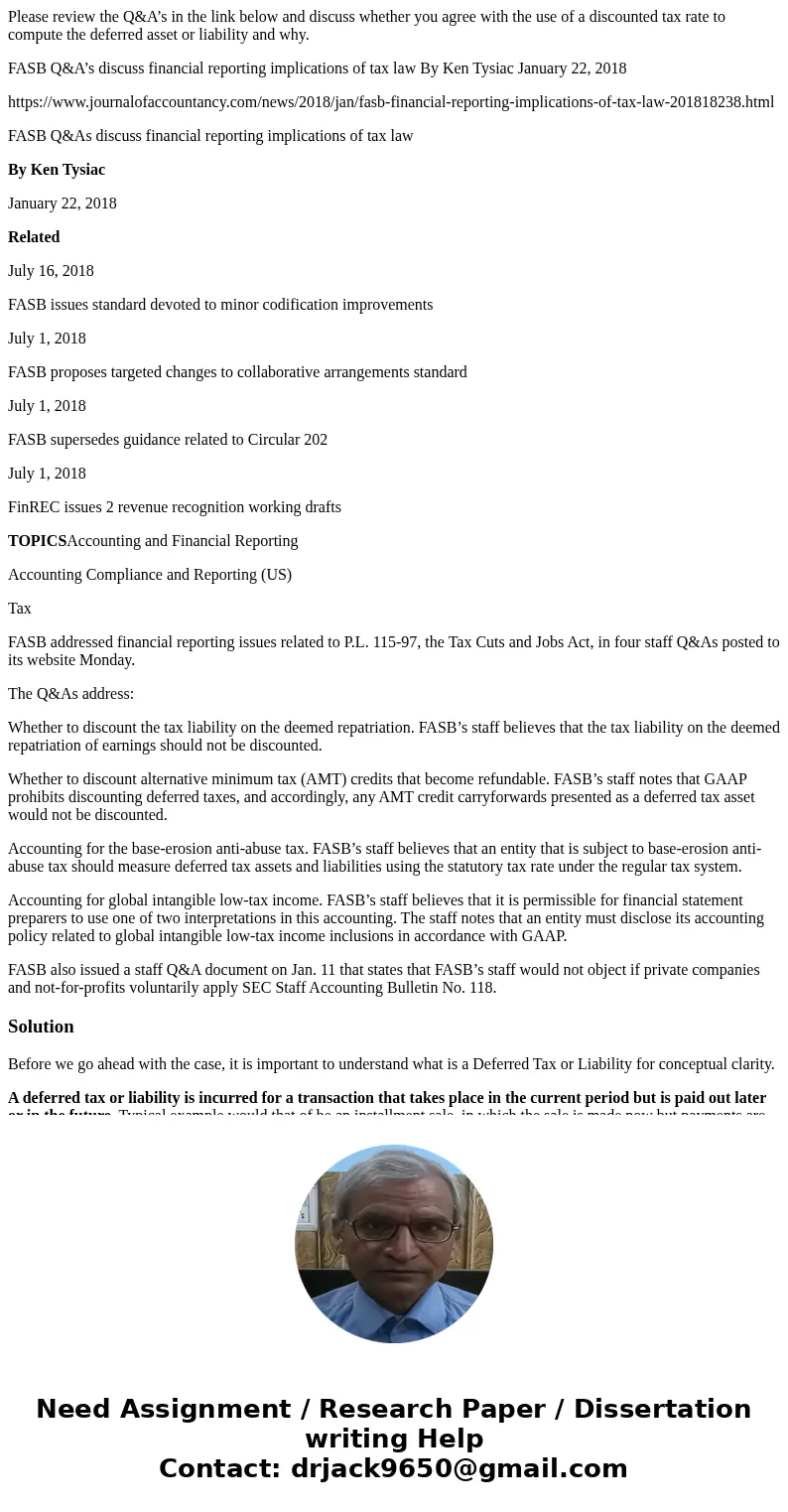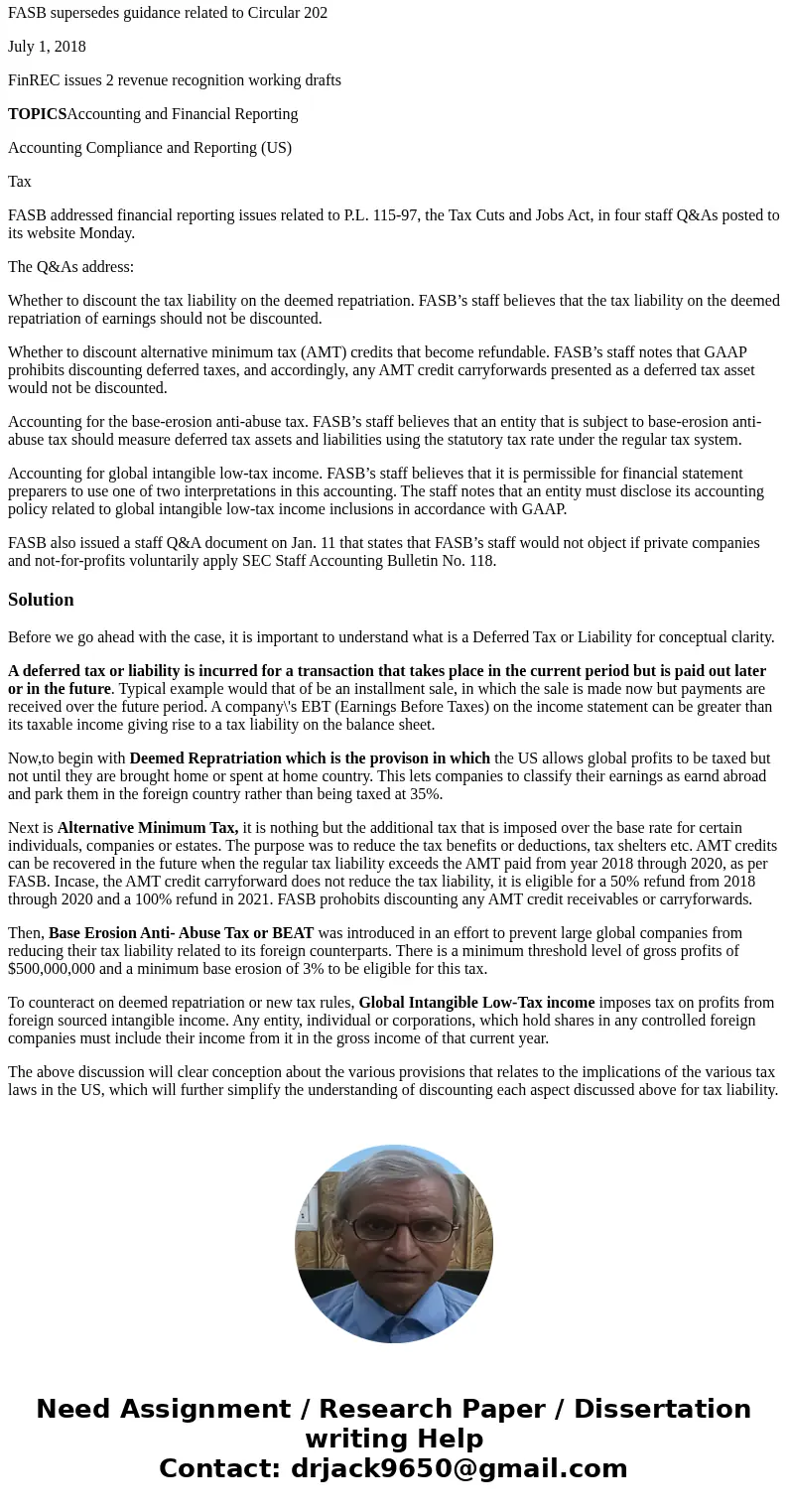Please review the QAs in the link below and discuss whether
Please review the Q&A’s in the link below and discuss whether you agree with the use of a discounted tax rate to compute the deferred asset or liability and why.
FASB Q&A’s discuss financial reporting implications of tax law By Ken Tysiac January 22, 2018
https://www.journalofaccountancy.com/news/2018/jan/fasb-financial-reporting-implications-of-tax-law-201818238.html
FASB Q&As discuss financial reporting implications of tax law
By Ken Tysiac
January 22, 2018
Related
July 16, 2018
FASB issues standard devoted to minor codification improvements
July 1, 2018
FASB proposes targeted changes to collaborative arrangements standard
July 1, 2018
FASB supersedes guidance related to Circular 202
July 1, 2018
FinREC issues 2 revenue recognition working drafts
TOPICSAccounting and Financial Reporting
Accounting Compliance and Reporting (US)
Tax
FASB addressed financial reporting issues related to P.L. 115-97, the Tax Cuts and Jobs Act, in four staff Q&As posted to its website Monday.
The Q&As address:
Whether to discount the tax liability on the deemed repatriation. FASB’s staff believes that the tax liability on the deemed repatriation of earnings should not be discounted.
Whether to discount alternative minimum tax (AMT) credits that become refundable. FASB’s staff notes that GAAP prohibits discounting deferred taxes, and accordingly, any AMT credit carryforwards presented as a deferred tax asset would not be discounted.
Accounting for the base-erosion anti-abuse tax. FASB’s staff believes that an entity that is subject to base-erosion anti-abuse tax should measure deferred tax assets and liabilities using the statutory tax rate under the regular tax system.
Accounting for global intangible low-tax income. FASB’s staff believes that it is permissible for financial statement preparers to use one of two interpretations in this accounting. The staff notes that an entity must disclose its accounting policy related to global intangible low-tax income inclusions in accordance with GAAP.
FASB also issued a staff Q&A document on Jan. 11 that states that FASB’s staff would not object if private companies and not-for-profits voluntarily apply SEC Staff Accounting Bulletin No. 118.
Solution
Before we go ahead with the case, it is important to understand what is a Deferred Tax or Liability for conceptual clarity.
A deferred tax or liability is incurred for a transaction that takes place in the current period but is paid out later or in the future. Typical example would that of be an installment sale, in which the sale is made now but payments are received over the future period. A company\'s EBT (Earnings Before Taxes) on the income statement can be greater than its taxable income giving rise to a tax liability on the balance sheet.
Now,to begin with Deemed Repratriation which is the provison in which the US allows global profits to be taxed but not until they are brought home or spent at home country. This lets companies to classify their earnings as earnd abroad and park them in the foreign country rather than being taxed at 35%.
Next is Alternative Minimum Tax, it is nothing but the additional tax that is imposed over the base rate for certain individuals, companies or estates. The purpose was to reduce the tax benefits or deductions, tax shelters etc. AMT credits can be recovered in the future when the regular tax liability exceeds the AMT paid from year 2018 through 2020, as per FASB. Incase, the AMT credit carryforward does not reduce the tax liability, it is eligible for a 50% refund from 2018 through 2020 and a 100% refund in 2021. FASB prohobits discounting any AMT credit receivables or carryforwards.
Then, Base Erosion Anti- Abuse Tax or BEAT was introduced in an effort to prevent large global companies from reducing their tax liability related to its foreign counterparts. There is a minimum threshold level of gross profits of $500,000,000 and a minimum base erosion of 3% to be eligible for this tax.
To counteract on deemed repatriation or new tax rules, Global Intangible Low-Tax income imposes tax on profits from foreign sourced intangible income. Any entity, individual or corporations, which hold shares in any controlled foreign companies must include their income from it in the gross income of that current year.
The above discussion will clear conception about the various provisions that relates to the implications of the various tax laws in the US, which will further simplify the understanding of discounting each aspect discussed above for tax liability.


 Homework Sourse
Homework Sourse